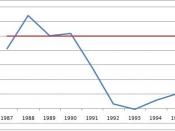Question : Japan's bubble economy burst in the late 1980's, sending Japan into a prolonged period of very slow growth from which they began to recover only in 2003. Japanese society also changed greatly in that time, particularly the outlooks of people under 40. How are these events reflected in the Japanese enterprise management system?
The culture and economy of Japan has long been the focus of curious outsiders keen to understand their mix of Eastern and Western values, and how this may connect to the economic highs and lows of Japan's recent past. To study the 'Japanese miracle', which received so much attention in the past, seems dubious in light of the hardships endured in Japan since the burst of the 'bubble economy'. But how do Japanese themselves reflect upon this change? For the current younger generation, the hardships of the 1990's have changed outlooks, attitudes and expectations greatly.
These attitudes are in response to the new economic climate in Japan, and have in themselves altered the landscape of the Japanese enterprise management system. This paper will outline how and why the youth of Japan have changed since the bubble burst, and speculate upon the change in relationship between young workers in Japan and the Japanese management system.
The last 25 years have been interesting times in Japan, and have created an interesting generation. Japan's economic miracle since the end of World War Two, came to a rather abrupt end in the early 1990's. With the stock market crash at the beginning of 1990, the corresponding economic hardships and the bankruptcy of previously 'stable' institutions the labour and financial environment for Japanese people suddenly looked far from miraculous. "The price of residential land in Japan's six largest cities doubled between March 1987 and September 1990"(Morris-Suzuki 2000,p.311). This...



Great Essay
Great Essay. Wrote excellently. Great list of references. Well done.
1 out of 1 people found this comment useful.